Reflective Essay: Business Skills in Managing Innovation (Business 1)
VerifiedAdded on 2021/11/22
|10
|2824
|125
Report
AI Summary
This report presents a reflective essay that delves into four critical aspects of business: teamwork, communication, self-management, and positive attitude. The essay is structured around the Gibbs Reflective Cycle, providing a detailed examination of each skill. The communication section discusses the gap between organizational plans and employee actions, highlighting the importance of effective training and presentation skills. The teamwork segment analyzes the role of a 'finisher' within a team, addressing challenges related to delegation, time management, and quality control. Self-management is explored as a crucial skill for reducing chaos and improving organizational efficiency, emphasizing time management and the ability to balance personal and professional life. Finally, the essay examines the significance of a positive attitude in overcoming barriers and avoiding negative thinking. The conclusion synthesizes the key findings, emphasizing the importance of continuous improvement and practical action plans for enhancing these essential business skills.
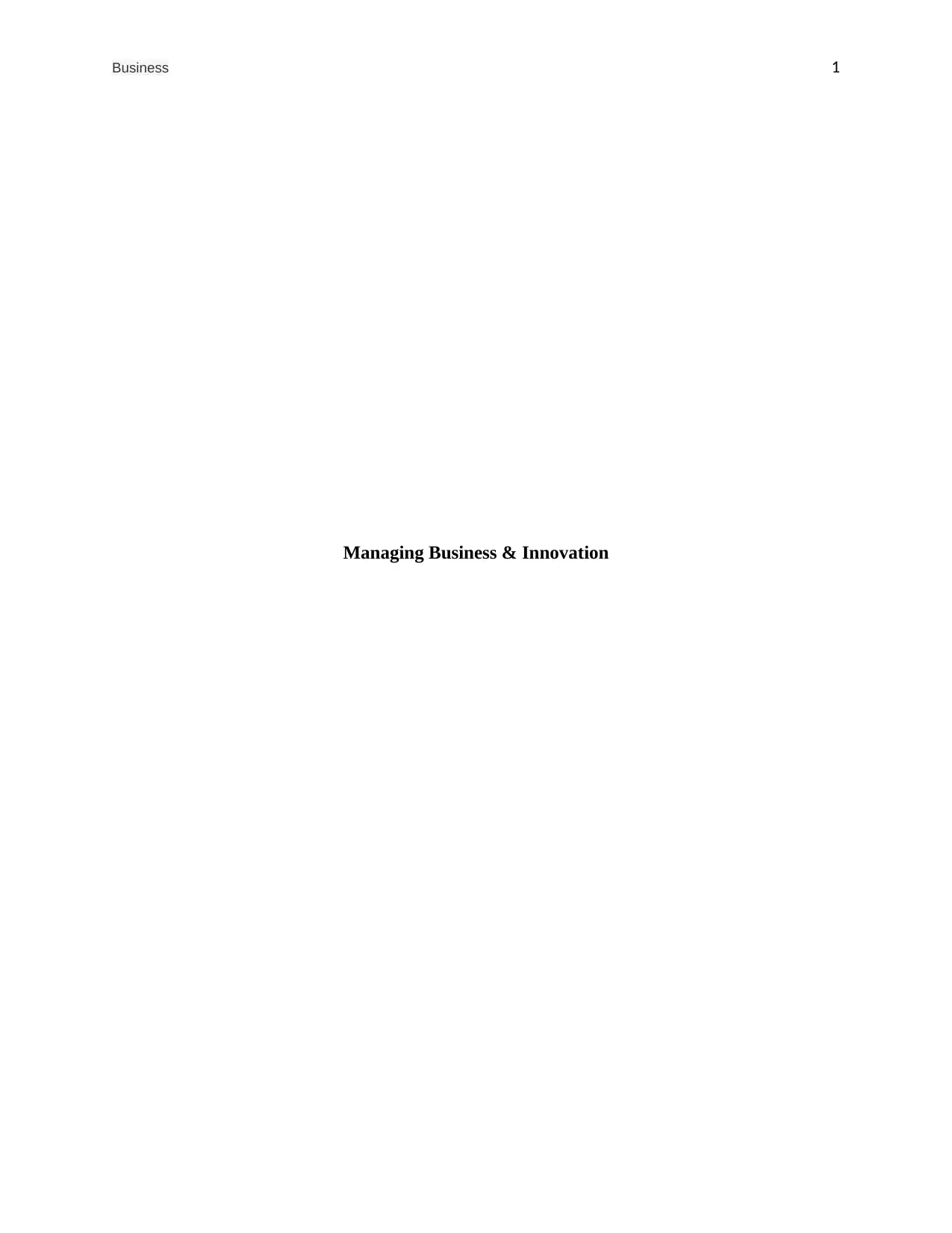
Business 1
Managing Business & Innovation
Managing Business & Innovation
Paraphrase This Document
Need a fresh take? Get an instant paraphrase of this document with our AI Paraphraser
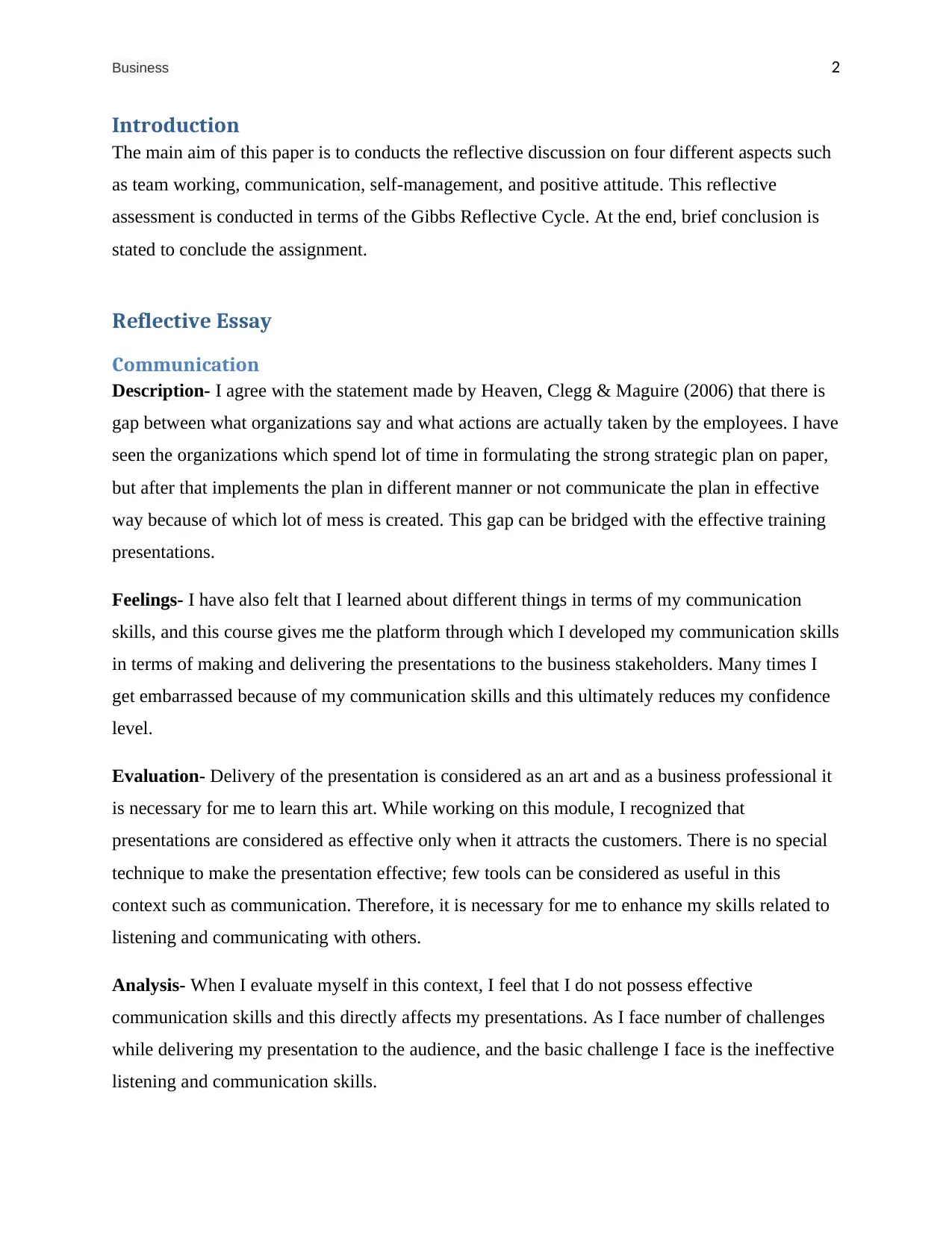
Business 2
Introduction
The main aim of this paper is to conducts the reflective discussion on four different aspects such
as team working, communication, self-management, and positive attitude. This reflective
assessment is conducted in terms of the Gibbs Reflective Cycle. At the end, brief conclusion is
stated to conclude the assignment.
Reflective Essay
Communication
Description- I agree with the statement made by Heaven, Clegg & Maguire (2006) that there is
gap between what organizations say and what actions are actually taken by the employees. I have
seen the organizations which spend lot of time in formulating the strong strategic plan on paper,
but after that implements the plan in different manner or not communicate the plan in effective
way because of which lot of mess is created. This gap can be bridged with the effective training
presentations.
Feelings- I have also felt that I learned about different things in terms of my communication
skills, and this course gives me the platform through which I developed my communication skills
in terms of making and delivering the presentations to the business stakeholders. Many times I
get embarrassed because of my communication skills and this ultimately reduces my confidence
level.
Evaluation- Delivery of the presentation is considered as an art and as a business professional it
is necessary for me to learn this art. While working on this module, I recognized that
presentations are considered as effective only when it attracts the customers. There is no special
technique to make the presentation effective; few tools can be considered as useful in this
context such as communication. Therefore, it is necessary for me to enhance my skills related to
listening and communicating with others.
Analysis- When I evaluate myself in this context, I feel that I do not possess effective
communication skills and this directly affects my presentations. As I face number of challenges
while delivering my presentation to the audience, and the basic challenge I face is the ineffective
listening and communication skills.
Introduction
The main aim of this paper is to conducts the reflective discussion on four different aspects such
as team working, communication, self-management, and positive attitude. This reflective
assessment is conducted in terms of the Gibbs Reflective Cycle. At the end, brief conclusion is
stated to conclude the assignment.
Reflective Essay
Communication
Description- I agree with the statement made by Heaven, Clegg & Maguire (2006) that there is
gap between what organizations say and what actions are actually taken by the employees. I have
seen the organizations which spend lot of time in formulating the strong strategic plan on paper,
but after that implements the plan in different manner or not communicate the plan in effective
way because of which lot of mess is created. This gap can be bridged with the effective training
presentations.
Feelings- I have also felt that I learned about different things in terms of my communication
skills, and this course gives me the platform through which I developed my communication skills
in terms of making and delivering the presentations to the business stakeholders. Many times I
get embarrassed because of my communication skills and this ultimately reduces my confidence
level.
Evaluation- Delivery of the presentation is considered as an art and as a business professional it
is necessary for me to learn this art. While working on this module, I recognized that
presentations are considered as effective only when it attracts the customers. There is no special
technique to make the presentation effective; few tools can be considered as useful in this
context such as communication. Therefore, it is necessary for me to enhance my skills related to
listening and communicating with others.
Analysis- When I evaluate myself in this context, I feel that I do not possess effective
communication skills and this directly affects my presentations. As I face number of challenges
while delivering my presentation to the audience, and the basic challenge I face is the ineffective
listening and communication skills.
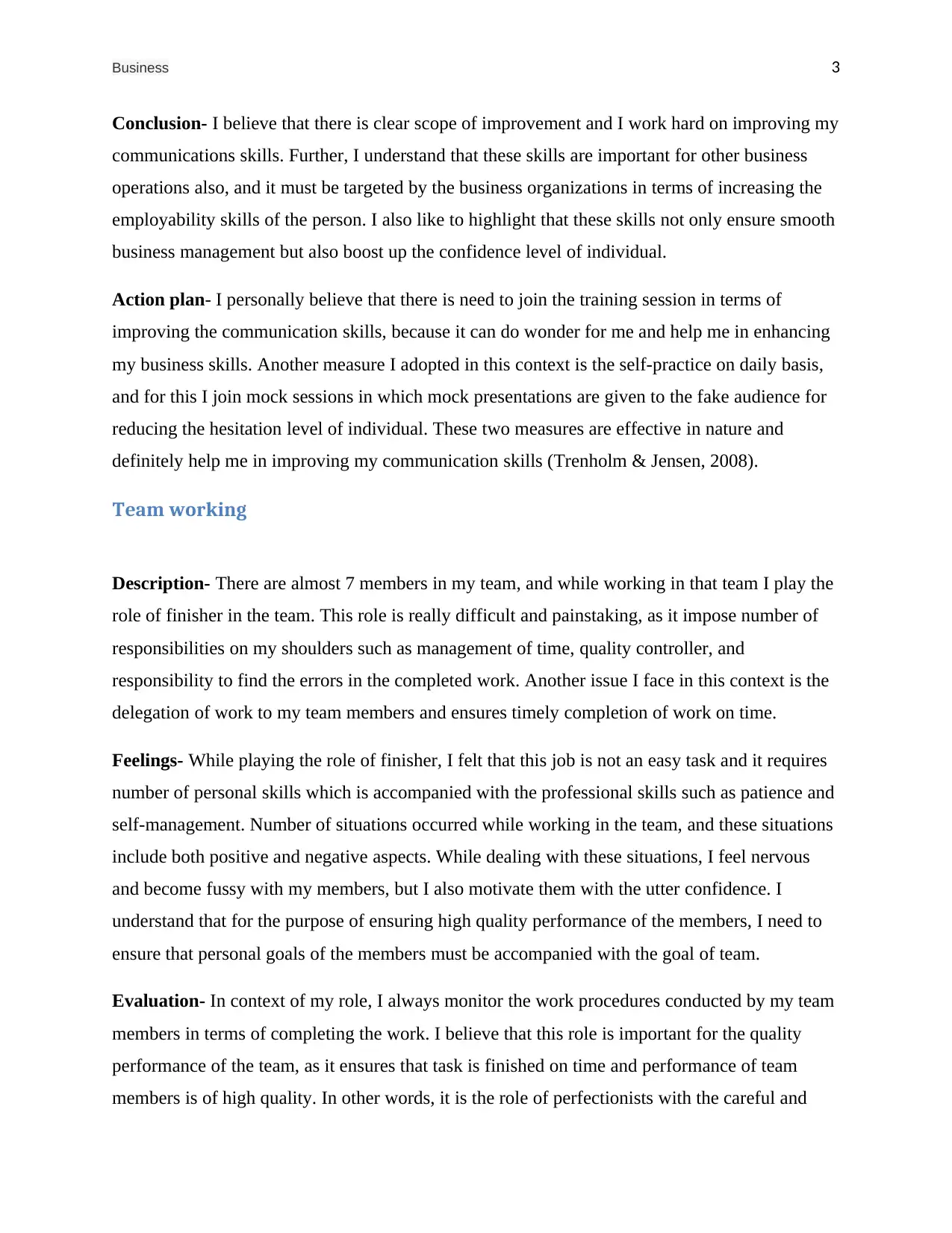
Business 3
Conclusion- I believe that there is clear scope of improvement and I work hard on improving my
communications skills. Further, I understand that these skills are important for other business
operations also, and it must be targeted by the business organizations in terms of increasing the
employability skills of the person. I also like to highlight that these skills not only ensure smooth
business management but also boost up the confidence level of individual.
Action plan- I personally believe that there is need to join the training session in terms of
improving the communication skills, because it can do wonder for me and help me in enhancing
my business skills. Another measure I adopted in this context is the self-practice on daily basis,
and for this I join mock sessions in which mock presentations are given to the fake audience for
reducing the hesitation level of individual. These two measures are effective in nature and
definitely help me in improving my communication skills (Trenholm & Jensen, 2008).
Team working
Description- There are almost 7 members in my team, and while working in that team I play the
role of finisher in the team. This role is really difficult and painstaking, as it impose number of
responsibilities on my shoulders such as management of time, quality controller, and
responsibility to find the errors in the completed work. Another issue I face in this context is the
delegation of work to my team members and ensures timely completion of work on time.
Feelings- While playing the role of finisher, I felt that this job is not an easy task and it requires
number of personal skills which is accompanied with the professional skills such as patience and
self-management. Number of situations occurred while working in the team, and these situations
include both positive and negative aspects. While dealing with these situations, I feel nervous
and become fussy with my members, but I also motivate them with the utter confidence. I
understand that for the purpose of ensuring high quality performance of the members, I need to
ensure that personal goals of the members must be accompanied with the goal of team.
Evaluation- In context of my role, I always monitor the work procedures conducted by my team
members in terms of completing the work. I believe that this role is important for the quality
performance of the team, as it ensures that task is finished on time and performance of team
members is of high quality. In other words, it is the role of perfectionists with the careful and
Conclusion- I believe that there is clear scope of improvement and I work hard on improving my
communications skills. Further, I understand that these skills are important for other business
operations also, and it must be targeted by the business organizations in terms of increasing the
employability skills of the person. I also like to highlight that these skills not only ensure smooth
business management but also boost up the confidence level of individual.
Action plan- I personally believe that there is need to join the training session in terms of
improving the communication skills, because it can do wonder for me and help me in enhancing
my business skills. Another measure I adopted in this context is the self-practice on daily basis,
and for this I join mock sessions in which mock presentations are given to the fake audience for
reducing the hesitation level of individual. These two measures are effective in nature and
definitely help me in improving my communication skills (Trenholm & Jensen, 2008).
Team working
Description- There are almost 7 members in my team, and while working in that team I play the
role of finisher in the team. This role is really difficult and painstaking, as it impose number of
responsibilities on my shoulders such as management of time, quality controller, and
responsibility to find the errors in the completed work. Another issue I face in this context is the
delegation of work to my team members and ensures timely completion of work on time.
Feelings- While playing the role of finisher, I felt that this job is not an easy task and it requires
number of personal skills which is accompanied with the professional skills such as patience and
self-management. Number of situations occurred while working in the team, and these situations
include both positive and negative aspects. While dealing with these situations, I feel nervous
and become fussy with my members, but I also motivate them with the utter confidence. I
understand that for the purpose of ensuring high quality performance of the members, I need to
ensure that personal goals of the members must be accompanied with the goal of team.
Evaluation- In context of my role, I always monitor the work procedures conducted by my team
members in terms of completing the work. I believe that this role is important for the quality
performance of the team, as it ensures that task is finished on time and performance of team
members is of high quality. In other words, it is the role of perfectionists with the careful and
⊘ This is a preview!⊘
Do you want full access?
Subscribe today to unlock all pages.

Trusted by 1+ million students worldwide
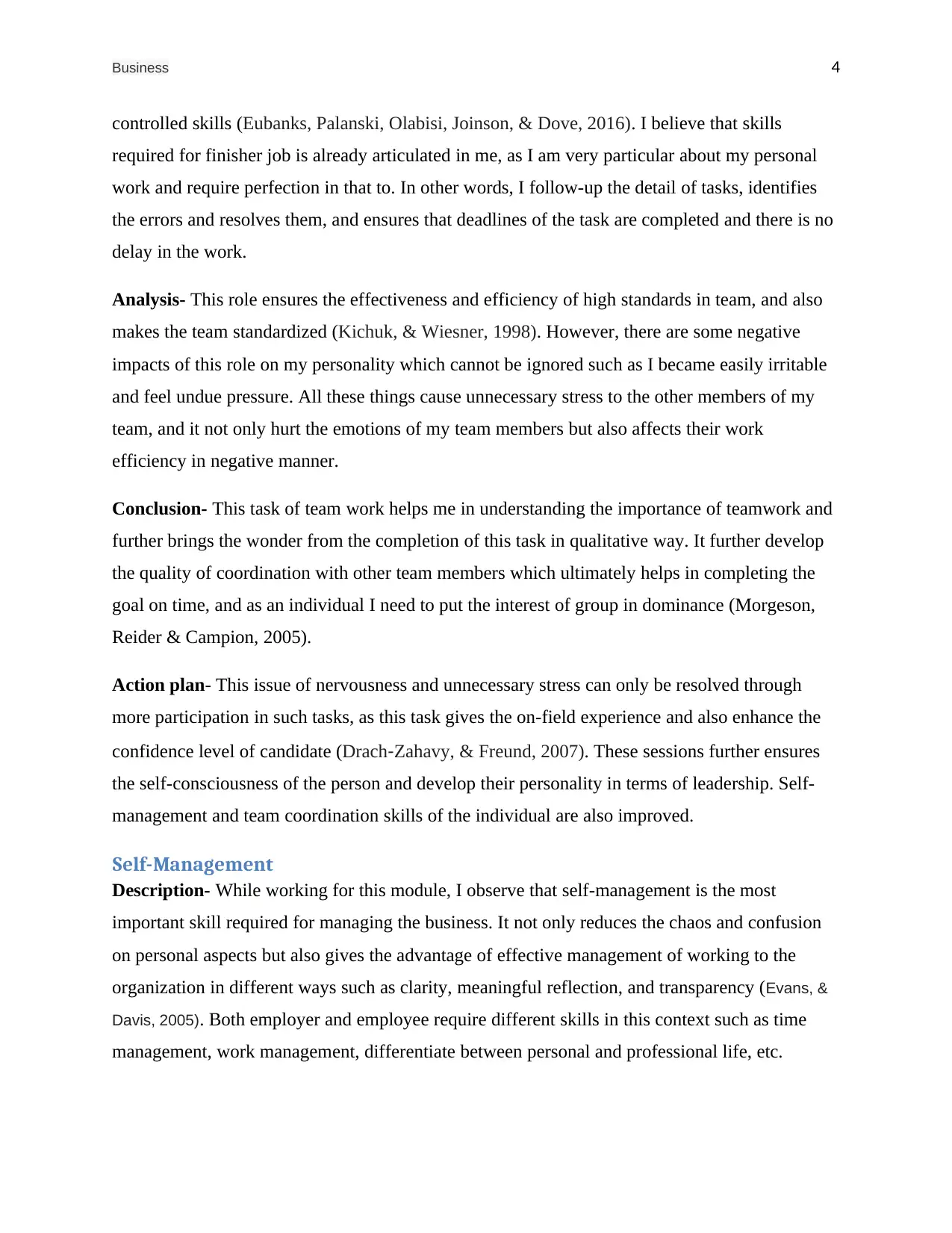
Business 4
controlled skills (Eubanks, Palanski, Olabisi, Joinson, & Dove, 2016). I believe that skills
required for finisher job is already articulated in me, as I am very particular about my personal
work and require perfection in that to. In other words, I follow-up the detail of tasks, identifies
the errors and resolves them, and ensures that deadlines of the task are completed and there is no
delay in the work.
Analysis- This role ensures the effectiveness and efficiency of high standards in team, and also
makes the team standardized (Kichuk, & Wiesner, 1998). However, there are some negative
impacts of this role on my personality which cannot be ignored such as I became easily irritable
and feel undue pressure. All these things cause unnecessary stress to the other members of my
team, and it not only hurt the emotions of my team members but also affects their work
efficiency in negative manner.
Conclusion- This task of team work helps me in understanding the importance of teamwork and
further brings the wonder from the completion of this task in qualitative way. It further develop
the quality of coordination with other team members which ultimately helps in completing the
goal on time, and as an individual I need to put the interest of group in dominance (Morgeson,
Reider & Campion, 2005).
Action plan- This issue of nervousness and unnecessary stress can only be resolved through
more participation in such tasks, as this task gives the on-field experience and also enhance the
confidence level of candidate (Drach‐Zahavy, & Freund, 2007). These sessions further ensures
the self-consciousness of the person and develop their personality in terms of leadership. Self-
management and team coordination skills of the individual are also improved.
Self-Management
Description- While working for this module, I observe that self-management is the most
important skill required for managing the business. It not only reduces the chaos and confusion
on personal aspects but also gives the advantage of effective management of working to the
organization in different ways such as clarity, meaningful reflection, and transparency (Evans, &
Davis, 2005). Both employer and employee require different skills in this context such as time
management, work management, differentiate between personal and professional life, etc.
controlled skills (Eubanks, Palanski, Olabisi, Joinson, & Dove, 2016). I believe that skills
required for finisher job is already articulated in me, as I am very particular about my personal
work and require perfection in that to. In other words, I follow-up the detail of tasks, identifies
the errors and resolves them, and ensures that deadlines of the task are completed and there is no
delay in the work.
Analysis- This role ensures the effectiveness and efficiency of high standards in team, and also
makes the team standardized (Kichuk, & Wiesner, 1998). However, there are some negative
impacts of this role on my personality which cannot be ignored such as I became easily irritable
and feel undue pressure. All these things cause unnecessary stress to the other members of my
team, and it not only hurt the emotions of my team members but also affects their work
efficiency in negative manner.
Conclusion- This task of team work helps me in understanding the importance of teamwork and
further brings the wonder from the completion of this task in qualitative way. It further develop
the quality of coordination with other team members which ultimately helps in completing the
goal on time, and as an individual I need to put the interest of group in dominance (Morgeson,
Reider & Campion, 2005).
Action plan- This issue of nervousness and unnecessary stress can only be resolved through
more participation in such tasks, as this task gives the on-field experience and also enhance the
confidence level of candidate (Drach‐Zahavy, & Freund, 2007). These sessions further ensures
the self-consciousness of the person and develop their personality in terms of leadership. Self-
management and team coordination skills of the individual are also improved.
Self-Management
Description- While working for this module, I observe that self-management is the most
important skill required for managing the business. It not only reduces the chaos and confusion
on personal aspects but also gives the advantage of effective management of working to the
organization in different ways such as clarity, meaningful reflection, and transparency (Evans, &
Davis, 2005). Both employer and employee require different skills in this context such as time
management, work management, differentiate between personal and professional life, etc.
Paraphrase This Document
Need a fresh take? Get an instant paraphrase of this document with our AI Paraphraser
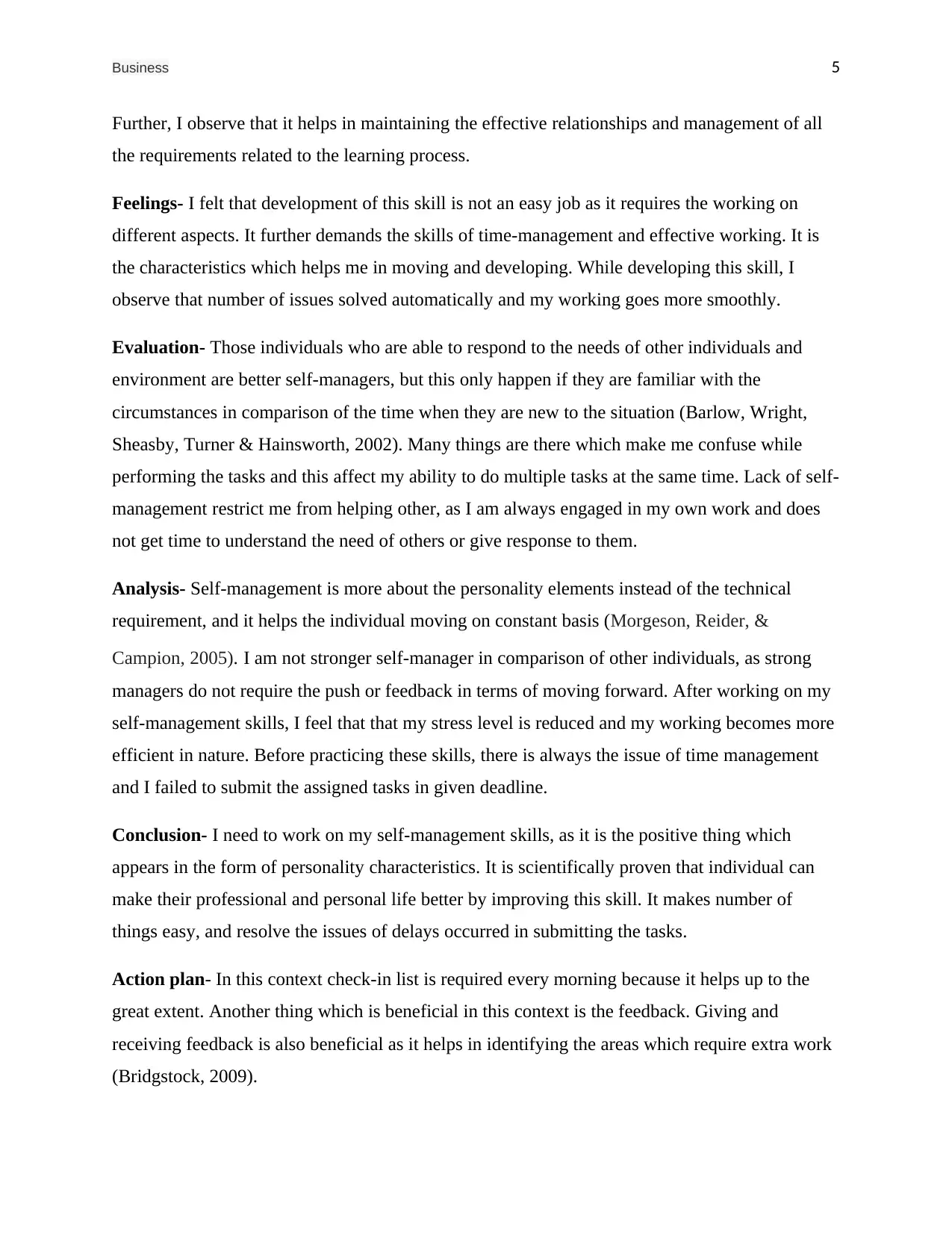
Business 5
Further, I observe that it helps in maintaining the effective relationships and management of all
the requirements related to the learning process.
Feelings- I felt that development of this skill is not an easy job as it requires the working on
different aspects. It further demands the skills of time-management and effective working. It is
the characteristics which helps me in moving and developing. While developing this skill, I
observe that number of issues solved automatically and my working goes more smoothly.
Evaluation- Those individuals who are able to respond to the needs of other individuals and
environment are better self-managers, but this only happen if they are familiar with the
circumstances in comparison of the time when they are new to the situation (Barlow, Wright,
Sheasby, Turner & Hainsworth, 2002). Many things are there which make me confuse while
performing the tasks and this affect my ability to do multiple tasks at the same time. Lack of self-
management restrict me from helping other, as I am always engaged in my own work and does
not get time to understand the need of others or give response to them.
Analysis- Self-management is more about the personality elements instead of the technical
requirement, and it helps the individual moving on constant basis (Morgeson, Reider, &
Campion, 2005). I am not stronger self-manager in comparison of other individuals, as strong
managers do not require the push or feedback in terms of moving forward. After working on my
self-management skills, I feel that that my stress level is reduced and my working becomes more
efficient in nature. Before practicing these skills, there is always the issue of time management
and I failed to submit the assigned tasks in given deadline.
Conclusion- I need to work on my self-management skills, as it is the positive thing which
appears in the form of personality characteristics. It is scientifically proven that individual can
make their professional and personal life better by improving this skill. It makes number of
things easy, and resolve the issues of delays occurred in submitting the tasks.
Action plan- In this context check-in list is required every morning because it helps up to the
great extent. Another thing which is beneficial in this context is the feedback. Giving and
receiving feedback is also beneficial as it helps in identifying the areas which require extra work
(Bridgstock, 2009).
Further, I observe that it helps in maintaining the effective relationships and management of all
the requirements related to the learning process.
Feelings- I felt that development of this skill is not an easy job as it requires the working on
different aspects. It further demands the skills of time-management and effective working. It is
the characteristics which helps me in moving and developing. While developing this skill, I
observe that number of issues solved automatically and my working goes more smoothly.
Evaluation- Those individuals who are able to respond to the needs of other individuals and
environment are better self-managers, but this only happen if they are familiar with the
circumstances in comparison of the time when they are new to the situation (Barlow, Wright,
Sheasby, Turner & Hainsworth, 2002). Many things are there which make me confuse while
performing the tasks and this affect my ability to do multiple tasks at the same time. Lack of self-
management restrict me from helping other, as I am always engaged in my own work and does
not get time to understand the need of others or give response to them.
Analysis- Self-management is more about the personality elements instead of the technical
requirement, and it helps the individual moving on constant basis (Morgeson, Reider, &
Campion, 2005). I am not stronger self-manager in comparison of other individuals, as strong
managers do not require the push or feedback in terms of moving forward. After working on my
self-management skills, I feel that that my stress level is reduced and my working becomes more
efficient in nature. Before practicing these skills, there is always the issue of time management
and I failed to submit the assigned tasks in given deadline.
Conclusion- I need to work on my self-management skills, as it is the positive thing which
appears in the form of personality characteristics. It is scientifically proven that individual can
make their professional and personal life better by improving this skill. It makes number of
things easy, and resolve the issues of delays occurred in submitting the tasks.
Action plan- In this context check-in list is required every morning because it helps up to the
great extent. Another thing which is beneficial in this context is the feedback. Giving and
receiving feedback is also beneficial as it helps in identifying the areas which require extra work
(Bridgstock, 2009).
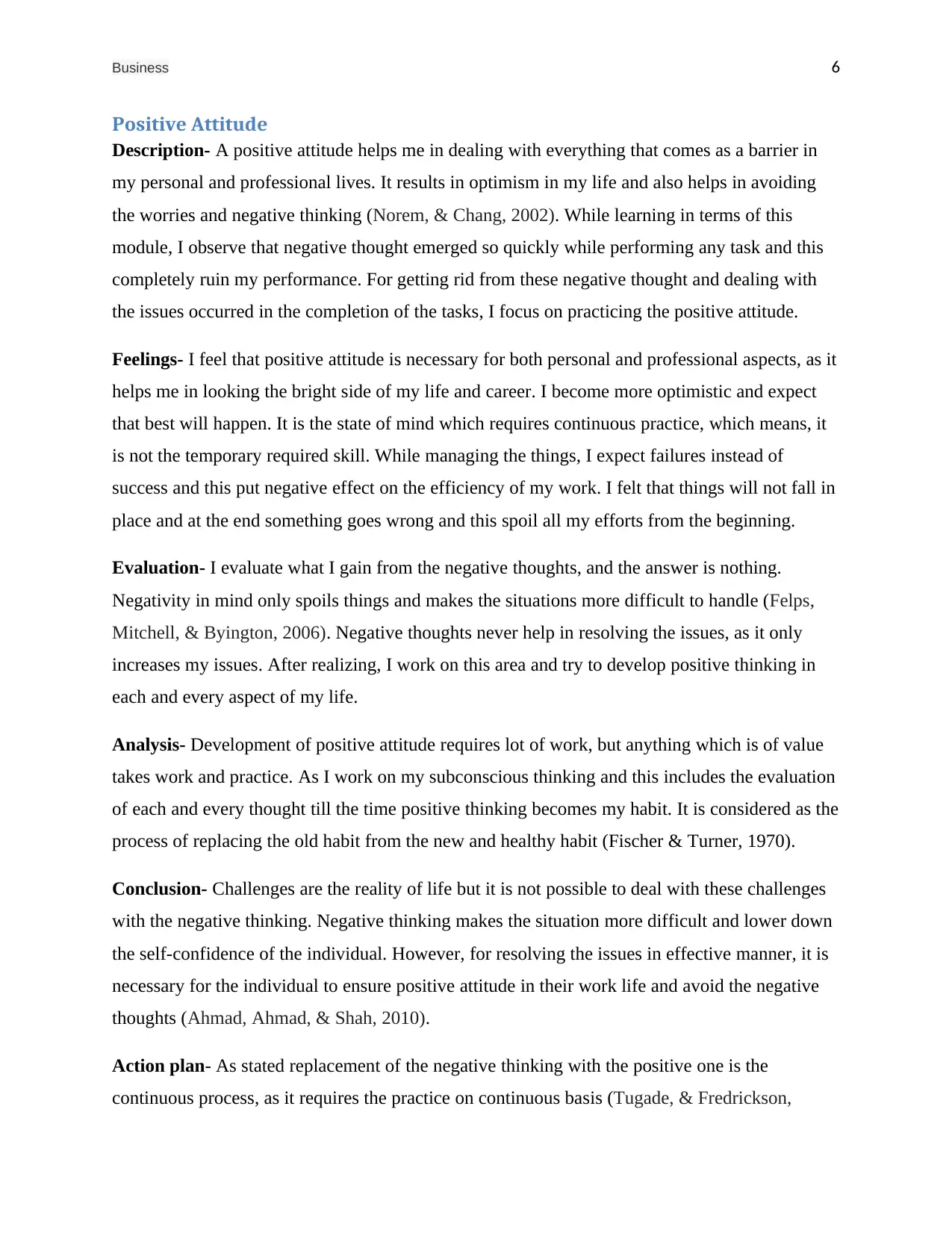
Business 6
Positive Attitude
Description- A positive attitude helps me in dealing with everything that comes as a barrier in
my personal and professional lives. It results in optimism in my life and also helps in avoiding
the worries and negative thinking (Norem, & Chang, 2002). While learning in terms of this
module, I observe that negative thought emerged so quickly while performing any task and this
completely ruin my performance. For getting rid from these negative thought and dealing with
the issues occurred in the completion of the tasks, I focus on practicing the positive attitude.
Feelings- I feel that positive attitude is necessary for both personal and professional aspects, as it
helps me in looking the bright side of my life and career. I become more optimistic and expect
that best will happen. It is the state of mind which requires continuous practice, which means, it
is not the temporary required skill. While managing the things, I expect failures instead of
success and this put negative effect on the efficiency of my work. I felt that things will not fall in
place and at the end something goes wrong and this spoil all my efforts from the beginning.
Evaluation- I evaluate what I gain from the negative thoughts, and the answer is nothing.
Negativity in mind only spoils things and makes the situations more difficult to handle (Felps,
Mitchell, & Byington, 2006). Negative thoughts never help in resolving the issues, as it only
increases my issues. After realizing, I work on this area and try to develop positive thinking in
each and every aspect of my life.
Analysis- Development of positive attitude requires lot of work, but anything which is of value
takes work and practice. As I work on my subconscious thinking and this includes the evaluation
of each and every thought till the time positive thinking becomes my habit. It is considered as the
process of replacing the old habit from the new and healthy habit (Fischer & Turner, 1970).
Conclusion- Challenges are the reality of life but it is not possible to deal with these challenges
with the negative thinking. Negative thinking makes the situation more difficult and lower down
the self-confidence of the individual. However, for resolving the issues in effective manner, it is
necessary for the individual to ensure positive attitude in their work life and avoid the negative
thoughts (Ahmad, Ahmad, & Shah, 2010).
Action plan- As stated replacement of the negative thinking with the positive one is the
continuous process, as it requires the practice on continuous basis (Tugade, & Fredrickson,
Positive Attitude
Description- A positive attitude helps me in dealing with everything that comes as a barrier in
my personal and professional lives. It results in optimism in my life and also helps in avoiding
the worries and negative thinking (Norem, & Chang, 2002). While learning in terms of this
module, I observe that negative thought emerged so quickly while performing any task and this
completely ruin my performance. For getting rid from these negative thought and dealing with
the issues occurred in the completion of the tasks, I focus on practicing the positive attitude.
Feelings- I feel that positive attitude is necessary for both personal and professional aspects, as it
helps me in looking the bright side of my life and career. I become more optimistic and expect
that best will happen. It is the state of mind which requires continuous practice, which means, it
is not the temporary required skill. While managing the things, I expect failures instead of
success and this put negative effect on the efficiency of my work. I felt that things will not fall in
place and at the end something goes wrong and this spoil all my efforts from the beginning.
Evaluation- I evaluate what I gain from the negative thoughts, and the answer is nothing.
Negativity in mind only spoils things and makes the situations more difficult to handle (Felps,
Mitchell, & Byington, 2006). Negative thoughts never help in resolving the issues, as it only
increases my issues. After realizing, I work on this area and try to develop positive thinking in
each and every aspect of my life.
Analysis- Development of positive attitude requires lot of work, but anything which is of value
takes work and practice. As I work on my subconscious thinking and this includes the evaluation
of each and every thought till the time positive thinking becomes my habit. It is considered as the
process of replacing the old habit from the new and healthy habit (Fischer & Turner, 1970).
Conclusion- Challenges are the reality of life but it is not possible to deal with these challenges
with the negative thinking. Negative thinking makes the situation more difficult and lower down
the self-confidence of the individual. However, for resolving the issues in effective manner, it is
necessary for the individual to ensure positive attitude in their work life and avoid the negative
thoughts (Ahmad, Ahmad, & Shah, 2010).
Action plan- As stated replacement of the negative thinking with the positive one is the
continuous process, as it requires the practice on continuous basis (Tugade, & Fredrickson,
⊘ This is a preview!⊘
Do you want full access?
Subscribe today to unlock all pages.

Trusted by 1+ million students worldwide
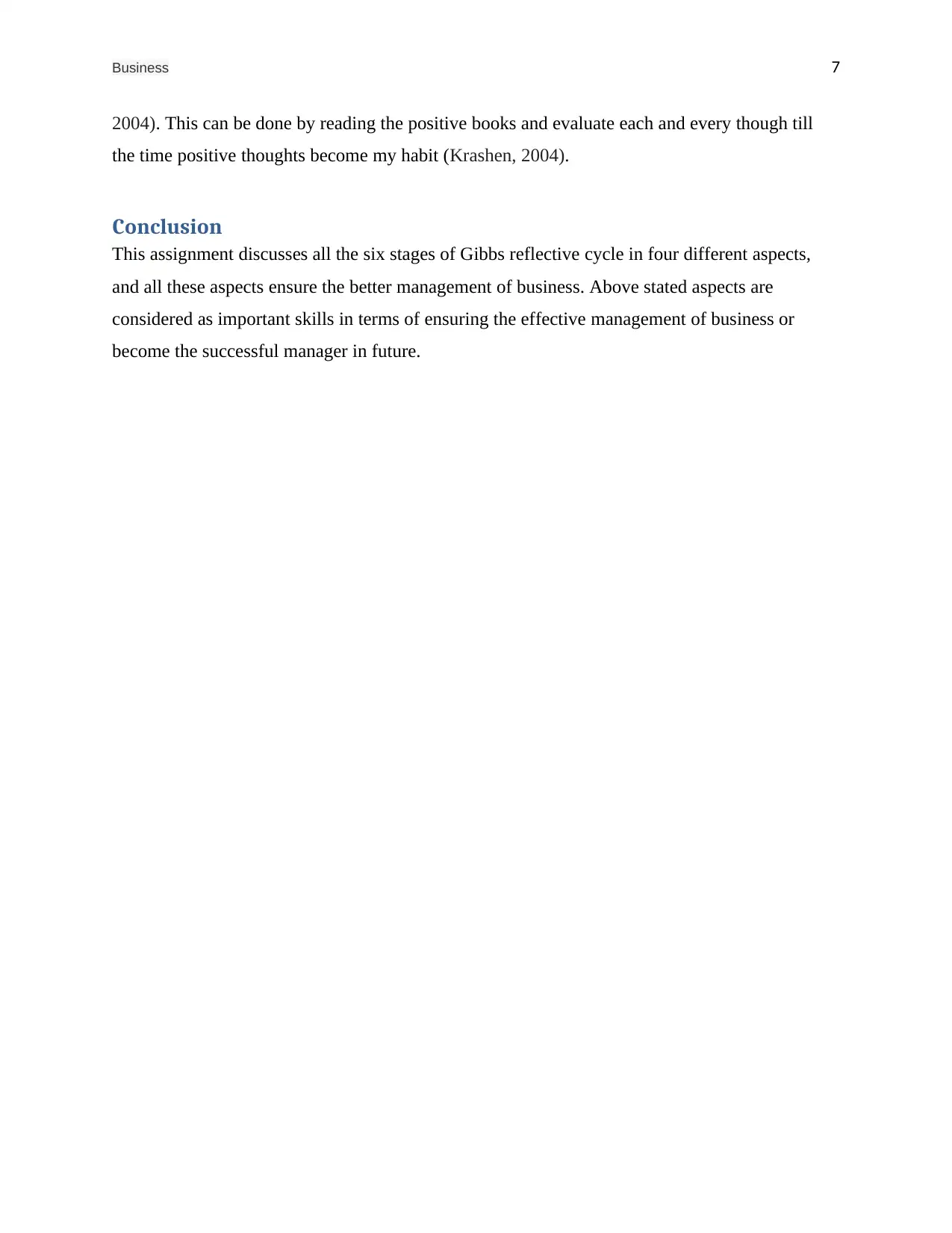
Business 7
2004). This can be done by reading the positive books and evaluate each and every though till
the time positive thoughts become my habit (Krashen, 2004).
Conclusion
This assignment discusses all the six stages of Gibbs reflective cycle in four different aspects,
and all these aspects ensure the better management of business. Above stated aspects are
considered as important skills in terms of ensuring the effective management of business or
become the successful manager in future.
2004). This can be done by reading the positive books and evaluate each and every though till
the time positive thoughts become my habit (Krashen, 2004).
Conclusion
This assignment discusses all the six stages of Gibbs reflective cycle in four different aspects,
and all these aspects ensure the better management of business. Above stated aspects are
considered as important skills in terms of ensuring the effective management of business or
become the successful manager in future.
Paraphrase This Document
Need a fresh take? Get an instant paraphrase of this document with our AI Paraphraser
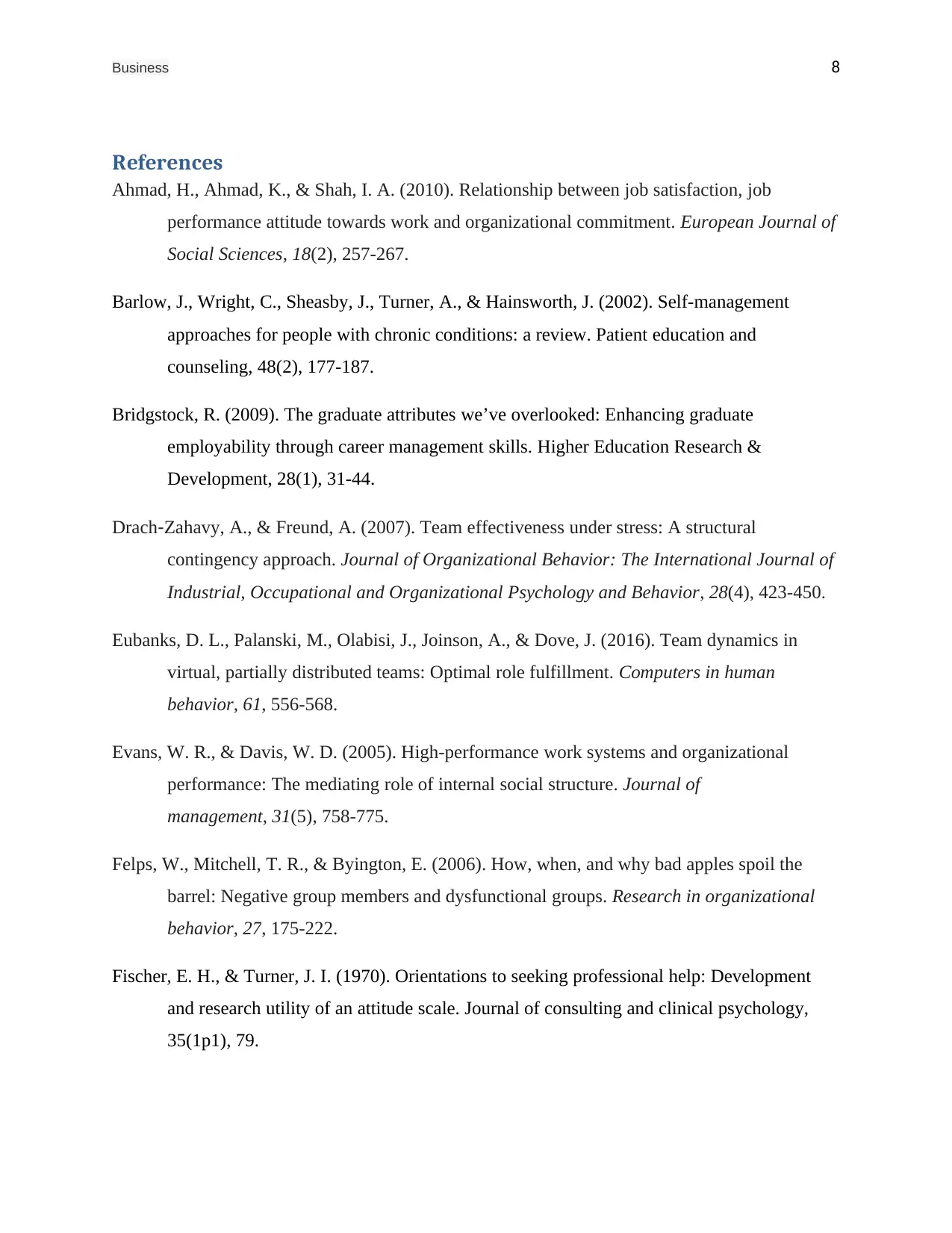
Business 8
References
Ahmad, H., Ahmad, K., & Shah, I. A. (2010). Relationship between job satisfaction, job
performance attitude towards work and organizational commitment. European Journal of
Social Sciences, 18(2), 257-267.
Barlow, J., Wright, C., Sheasby, J., Turner, A., & Hainsworth, J. (2002). Self-management
approaches for people with chronic conditions: a review. Patient education and
counseling, 48(2), 177-187.
Bridgstock, R. (2009). The graduate attributes we’ve overlooked: Enhancing graduate
employability through career management skills. Higher Education Research &
Development, 28(1), 31-44.
Drach‐Zahavy, A., & Freund, A. (2007). Team effectiveness under stress: A structural
contingency approach. Journal of Organizational Behavior: The International Journal of
Industrial, Occupational and Organizational Psychology and Behavior, 28(4), 423-450.
Eubanks, D. L., Palanski, M., Olabisi, J., Joinson, A., & Dove, J. (2016). Team dynamics in
virtual, partially distributed teams: Optimal role fulfillment. Computers in human
behavior, 61, 556-568.
Evans, W. R., & Davis, W. D. (2005). High-performance work systems and organizational
performance: The mediating role of internal social structure. Journal of
management, 31(5), 758-775.
Felps, W., Mitchell, T. R., & Byington, E. (2006). How, when, and why bad apples spoil the
barrel: Negative group members and dysfunctional groups. Research in organizational
behavior, 27, 175-222.
Fischer, E. H., & Turner, J. I. (1970). Orientations to seeking professional help: Development
and research utility of an attitude scale. Journal of consulting and clinical psychology,
35(1p1), 79.
References
Ahmad, H., Ahmad, K., & Shah, I. A. (2010). Relationship between job satisfaction, job
performance attitude towards work and organizational commitment. European Journal of
Social Sciences, 18(2), 257-267.
Barlow, J., Wright, C., Sheasby, J., Turner, A., & Hainsworth, J. (2002). Self-management
approaches for people with chronic conditions: a review. Patient education and
counseling, 48(2), 177-187.
Bridgstock, R. (2009). The graduate attributes we’ve overlooked: Enhancing graduate
employability through career management skills. Higher Education Research &
Development, 28(1), 31-44.
Drach‐Zahavy, A., & Freund, A. (2007). Team effectiveness under stress: A structural
contingency approach. Journal of Organizational Behavior: The International Journal of
Industrial, Occupational and Organizational Psychology and Behavior, 28(4), 423-450.
Eubanks, D. L., Palanski, M., Olabisi, J., Joinson, A., & Dove, J. (2016). Team dynamics in
virtual, partially distributed teams: Optimal role fulfillment. Computers in human
behavior, 61, 556-568.
Evans, W. R., & Davis, W. D. (2005). High-performance work systems and organizational
performance: The mediating role of internal social structure. Journal of
management, 31(5), 758-775.
Felps, W., Mitchell, T. R., & Byington, E. (2006). How, when, and why bad apples spoil the
barrel: Negative group members and dysfunctional groups. Research in organizational
behavior, 27, 175-222.
Fischer, E. H., & Turner, J. I. (1970). Orientations to seeking professional help: Development
and research utility of an attitude scale. Journal of consulting and clinical psychology,
35(1p1), 79.
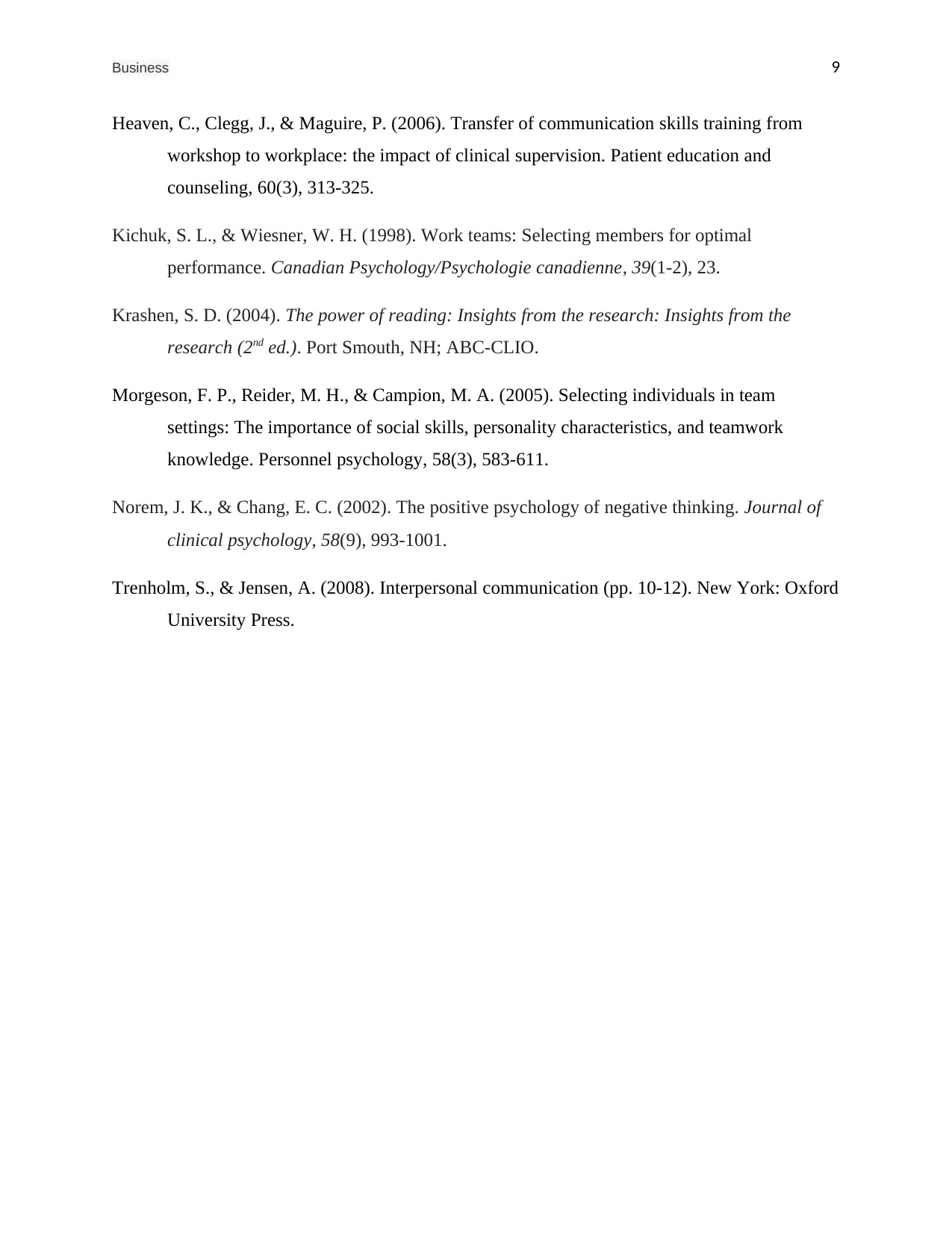
Business 9
Heaven, C., Clegg, J., & Maguire, P. (2006). Transfer of communication skills training from
workshop to workplace: the impact of clinical supervision. Patient education and
counseling, 60(3), 313-325.
Kichuk, S. L., & Wiesner, W. H. (1998). Work teams: Selecting members for optimal
performance. Canadian Psychology/Psychologie canadienne, 39(1-2), 23.
Krashen, S. D. (2004). The power of reading: Insights from the research: Insights from the
research (2nd ed.). Port Smouth, NH; ABC-CLIO.
Morgeson, F. P., Reider, M. H., & Campion, M. A. (2005). Selecting individuals in team
settings: The importance of social skills, personality characteristics, and teamwork
knowledge. Personnel psychology, 58(3), 583-611.
Norem, J. K., & Chang, E. C. (2002). The positive psychology of negative thinking. Journal of
clinical psychology, 58(9), 993-1001.
Trenholm, S., & Jensen, A. (2008). Interpersonal communication (pp. 10-12). New York: Oxford
University Press.
Heaven, C., Clegg, J., & Maguire, P. (2006). Transfer of communication skills training from
workshop to workplace: the impact of clinical supervision. Patient education and
counseling, 60(3), 313-325.
Kichuk, S. L., & Wiesner, W. H. (1998). Work teams: Selecting members for optimal
performance. Canadian Psychology/Psychologie canadienne, 39(1-2), 23.
Krashen, S. D. (2004). The power of reading: Insights from the research: Insights from the
research (2nd ed.). Port Smouth, NH; ABC-CLIO.
Morgeson, F. P., Reider, M. H., & Campion, M. A. (2005). Selecting individuals in team
settings: The importance of social skills, personality characteristics, and teamwork
knowledge. Personnel psychology, 58(3), 583-611.
Norem, J. K., & Chang, E. C. (2002). The positive psychology of negative thinking. Journal of
clinical psychology, 58(9), 993-1001.
Trenholm, S., & Jensen, A. (2008). Interpersonal communication (pp. 10-12). New York: Oxford
University Press.
⊘ This is a preview!⊘
Do you want full access?
Subscribe today to unlock all pages.

Trusted by 1+ million students worldwide

Business 10
1 out of 10
Related Documents
Your All-in-One AI-Powered Toolkit for Academic Success.
+13062052269
info@desklib.com
Available 24*7 on WhatsApp / Email
![[object Object]](/_next/static/media/star-bottom.7253800d.svg)
Unlock your academic potential
Copyright © 2020–2026 A2Z Services. All Rights Reserved. Developed and managed by ZUCOL.





